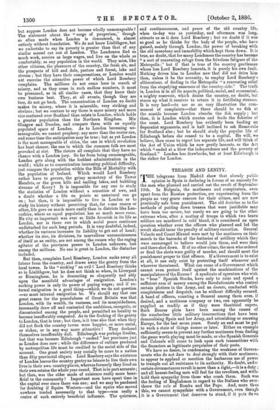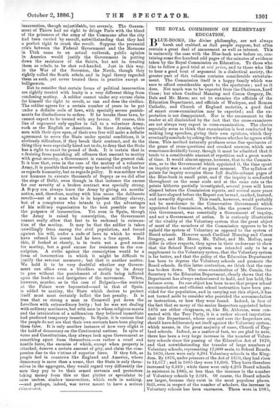TREASON AND LENITY.
THE telegrams from Madrid show that already public opinion in Spain is declaring in favour of an amnesty for the men who planned and carried out the revolt of September 19th. In Bulgaria, the mutineers and conspirators, even apart from the Russian protection, are experiencing from the
people no very grave censure for their crimes, and are now practically safe from punishment. The old doctrine as to the methods of putting down treason that were justifiable may have been too severe, but surely we are going to the other extreme when, after a mutiny of troops in which two brave soldiers are murdered in cold blood, it is considered an open question whether even the officers who planned and led the revolt should incur the penalty of military execution. General Velarde and Count Mirasol were met by the mutineers on their march to the barracks of the batteries of artillery which they were encouraged to believe would join them, and were then and there shot down. If of no other crime, the men who ordered or fired the shots were guilty of murder, and should meet the punishment proper to that offence. If a Government is to exist at all, it can only exist by protecting itself whenever and wherever threatened. What can come of a Government which cannot even protect itself against the machinations of the manipulators of the Bourse ? A syndicate of operators who wish to " bear " Spanish Stocks, have only to raise and spend a sufficient sum of money among the Revolutionists who control certain plotters in the Army, and an e'ineute, conducted with completeness and despatch, can be without difficulty secured. A band of officers, counting a General among them even, if desired, and a mutinous company or two, can apparently be supplied as readily as if they were theatrical supers. Such Bourse plots have been among the causes of the numberless little military insurrections that have been demoralising Spain and her Army, and astonishing or amusing Europe, for the last seven years. Surely an end must be pat to such a state of things sooner or later. Either an example sufficiently severe to prevent any further mutineers from finding the game worth playing must be made, or else Spanish Generals and Colonels will come to look upon such transactions with the financiers as legitimate perquisites of their posts.
We have no desire, in condemning the weakness of Govern- ments who do not dare to deal strongly with their mutineers, to appear to applaud or sanction the barbarous use of power to trample out all resistance to its authority. No doubt, under certain circumstances revolt is more than a right,—it is a duty ; and all honest-feeling men will feel for the revolters, and with- hold their sympathy from those who crush them. Such was the feeling of Englishmen in regard to the Italians who over- threw the rule of Bomba and the Pope. And, more than this, we cannot sympathise with a Government, even though it is a Government that deserves to stand, if it puts do va insurrection, though unjustifiable, too severely. The Govern- ment of Thiers had no right to deluge Paris with the blood of the prisoners of the army of the Commune after the city had been carried by assault, notwithstanding that they had a perfect right to crush the revolt. Suppose the perennial crisis between the Federal Government and the Mormons in Utah came to an actual outbreak, public opinion in America would justify the Government in putting down the resistance of the Saints, but not in treating them as rebels, to be shot red-handed. Just in this way, in the War of the Secession, the North, though they rightly called the South rebels, and in legal theory regarded them as such, yet never treated them in practice except as belligerents.
But to consider that certain forms of political insurrection are rightly treated with lenity is a very different thing from condoning mutiny. A soldier cannot under any excuse claim for himself the right to revolt, as can and does the civilian. The soldier agrees for a certain number of years to be put under a definite code of laws, with specially severe punish- ments for disobedience to orders. If he breaks these laws, he cannot expect to be treated with any favour. Of course, this line of argument only applies in full to a volunteer Army, such as the English or American. In these Armies, where men with their eyes open, of their own free will make a definite agreement to serve the State under special conditions, it is obviously ridiculous, if they break their contract, and do the thing they were especially hired not to do, to deny that the State has a right to exact its pound of flesh. It is certain that in refraining from punishing all offences that amount to mutiny with great severity, a Government is running the gravest risk. It is true that, even in the case of the mutiny of a volunteer Army, it is possible that severity may be carried not only too far as regards humanity, but as regards policy. It was neither wise nor humane to execute thousands of Sepoys as we did after the siege of Delhi, even though in that instance the excuse for our severity of a broken contract was specially strong. A &pay can always leave the Army by giving six months' notice, and, therefore, mutiny with him mean the deliberate revolt—not of a man who is in hopeless military slavery, but of a conspirator who intends to put the advantages of his military organisation to the best possible use for the purposm of insurrection. Yet even in Spain, though the Army is raised by conscription, the Government cannot really allow that fact to be reckoned in extenua- tion of the mutiny. It may be that the soldier is taken unwillingly from among the civil population, and forced against his will, under a code of laws to which he would have refused his assent had he been a free agent. But this, if looked at closely, is in truth not a good excuse for mutiny, but a good excuse for resistance to the con- scription. A strike against the conscription would be a form of insurrection in which it might be difficult to justify the severest measures ; but that is another matter. We hold it to be very doubtful whether any Govern- ment can allow even a bloodless mutiny in its Army to pass without the punishment of death being inflicted upon the leaders and instigators of the movement. When, however, murder, as in the case of Bulgaria—the sentries at the Palace were bayoneted—and in that of Spain, is added to mutiny, the State which desires to protect itself must most certainly inflict the last penalty. It is true that so strong a man as Cromwell put down the Levellers with extraordinary lenity ; but he was not dealing with ordinary mutineers, but with men in whom religious mania and the intoxication of a millennium they believed immediate had produced temporary insanity. In Spain, it is curious that the people do not see that their own servants have been playing them false. It is only another instance of how very slight is the hold of democracy on the Continental nations. In spite of votes and Constitutions, they always look upon Government as something apart from themselves,—as rather a cruel and hostile force, the enemies of which, except when property is attacked, deserve a certain amount of pity, and claim the com- passion due to the victims of superior force. If they felt., as people feel in countries like England and America, where democracy is more than a name, that the State is only them- selves in the aggregate, they would regard very differently the men they pay to be their armed servants and protectors taking money from this or that plotter or speculator to raise useless, aimless insurrection, which ends in nothing, —and perhaps, indeed, was never meant to have a serious anoltenient.



































 Previous page
Previous page